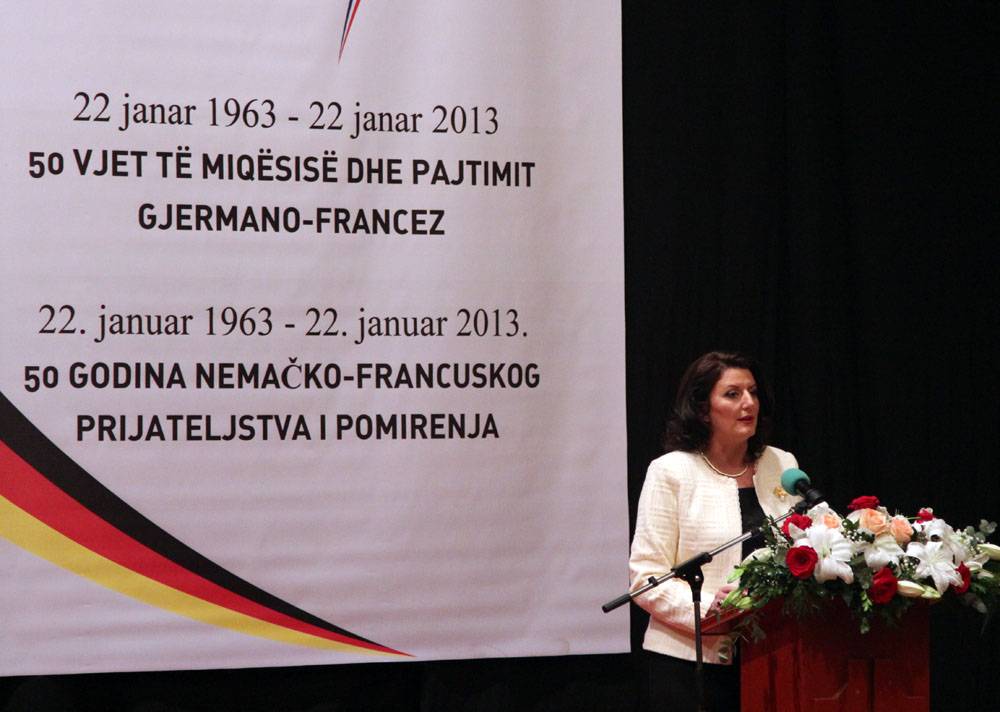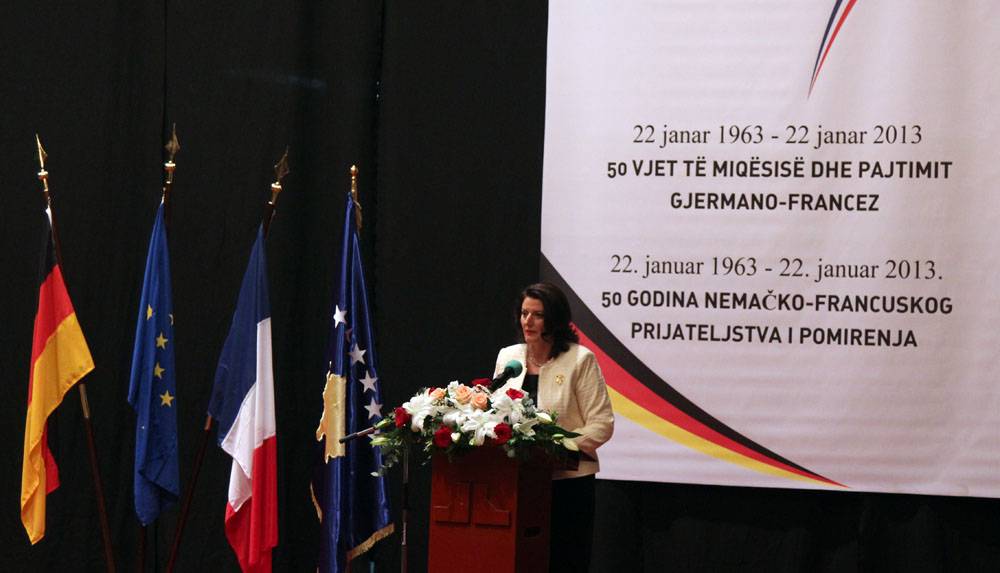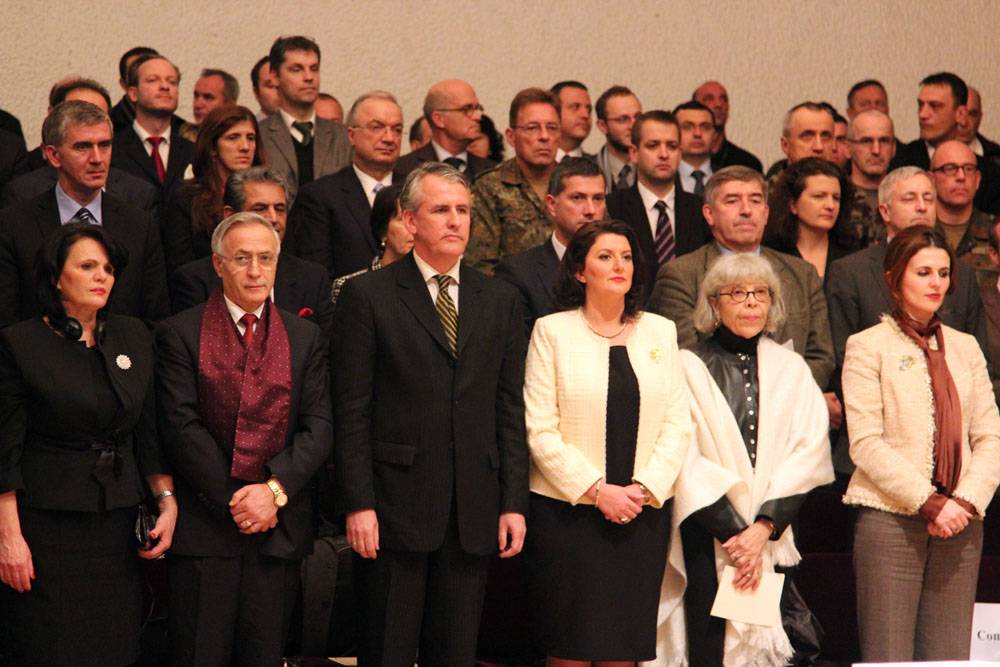Fifty years ago, on a cold January day, French President Charles de Gaulle and German Chancellor Konrad Adenauer gathered up the courage to do what no predecessor of theirs dared to do – to change the direction of history.
Honourable leaders of the institutions of the Republic of Kosovo,
Honourable Ambassador of the Federal Republic of Germany,
Honourable Ambassador of the Republic of France,
Honourable participants,
Ladies and Gentlemen;
Fifty years ago, on a cold January day, French President Charles de Gaulle and German Chancellor Konrad Adenauer gathered up the courage to do what no predecessor of theirs dared to do – to change the direction of history.
Not only did they change the future of their respective countries, but upon the ruins of wars and the state of perpetual insecurity, they laid the foundation of a united Europe.
A Europe in peace and prosperity, where sovereign and independent states- sworn enemies until the very yesterday- would commit themselves to a common European vision.
This act would augment their wellbeing and would totally diminish the possibility for the resurrection of hatred and destruction which had characterized the Franco-German relations during the first and second world wars.
They agreed that historic mistakes, which had undermined all attempts to build a normal life in Europe, may not be corrected without initial recognition of the reality already in existence in these two states;
That economic prosperity and the values and ideals of democracy may not come to life without cessation of animosities;
That peace and internal stability, crucial to external empowerment, may not be built under threat and duress; that advancement of Europe in general and of these two countries in particular may not happen without a historic reconciliation between them- not forgetting the history and the sacrifice of many generations for the protection of the territorial integrity of the two states- but promising that the war must never replace dialogue and that the bitter past, full of victims and suffering, must never be repeated.
Today, in all corners of Europe, Europe that has seen progress in the past five decades as never before, this historic signature upon an agreement of friendship between two states engulfed in state of war, two peoples that in modern times knew nothing but hatred for each other, is remembered with piety.
It is exactly the Elysée Treaty that unified the divided Europe, by giving life to a union of values, to an alliance of cooperation, a long term vision and an alternative that will forcefully challenge the animosity and make the war obsolete.
Honourable participants,
This reflection upon an event of such historic gravity becomes even more familiar today, during this period of developments in Balkans, when we are vigorously trying to change the course of history, to leave hatred behind us, together with the loss and suffering that have touched the lives of many of us.
As inscribed in the memoirs of both the French and the German leaders, to be at the forefront of these attempts to normalize relations between the two estranged countries, is not an easy task, as many wounds still remain open and the memory of the sufferings is still fresh. Also, justice has not been fully served.
But, the dialogue and building of mutual trust remain the only option in order to compel the states to take upon the responsibilities they have toward each other and to behave responsibly with their neighbours, in accordance with international laws and conventions, while never forgetting who the is the aggressor and who is the victim.
It is this deep conviction that does not allow us to pass the burden of the old animosities to the younger generations and it is this conviction that compels us to pave the way towards normalization of relations with the Republic of Serbia, as two independent and sovereign countries, who talk to each other with the sole aim to improve the wellbeing of their citizens, who have remained hostages of the aggressive and hegemonistic policies.
As leaders of the Republic of Kosovo, we have demonstrated our dedication and have taken upon ourselves the responsibilities, to, through the mediation of the European Union and strong support by the United States of America, dialogue with the Republic of Serbia for a better future of our citizens within a united Europe.
Western Balkans cannot remain hostage of someone’s will or old ideas. The time has come to think of the future and to meet our strategic aims of integration into European Union and NATO.
Upon this European Agenda, of a promise and dedication by European Union to keep the door open to the Balkan countries, to look forward and to convince ourselves once and for all, that as independent and sovereign states, we will accelerate our journey towards Brussels only through mutual cooperation and not by hindering one another.
Western Balkans does not lack courage to change the present for the sake of the future. This region needs much more support to change the old viewpoints and to direct the vision towards the western civilization.
European Union, in the same manner as us, the leaders of today, has a historic opportunity to make true the promise of united Europe. We need courage and spiritual strength, but much more, we need more respect for each other to open the gates of the European family, to which we belong.
For the sake of the present, for the sake of the future.
Ladies and Gentlemen,
Not long after both parties had signed the Friendship Treaty in France, the Franco-German agreement implementation in practice was lagging, forcing President De Gaulle to compare it with the short life of a rose.
“Roses of course they have their time… But the rose… is the most persistent of plants. It lasts through the winter,” stated the German Chancellor.
“A rose only lasts one morning,” said de Gaulle. “But a rose garden lasts a long time, if you want it to. It survives and blooms.”



